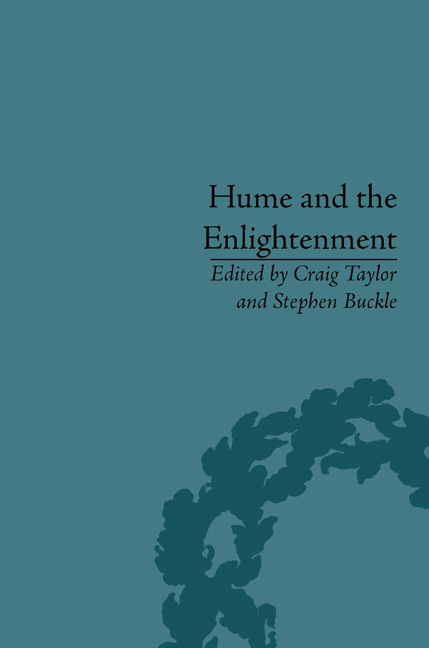Book contents
- Frontmatter
- CONTENTS
- Acknowledgements
- List of Contributors
- Abbreviations
- Introduction: Hume and his Intellectual Legacy
- 1 Hume and the Enlightenment
- 2 Will the Real Enlightenment Historian Please Stand Up? Catharine Macaulay versus David Hume
- 3 Philosophy, Historiography and the Enlightenment: A Response to Green
- 4 Hume's Enlightenment Aesthetics and Philosophy of Mathematics
- 5 Part 9 of Hume's Dialogues and ‘The Accurate Philosophical Turn of Cleanthes
- 6 ‘Strange Lengths’: Hume and Satire in the Dialogues Concerning Natural Religion
- 7 A Modern Malignant Demon? Hume's Scepticism with regard to Reason (Partly) Vindicated
- 8 Hume on Sympathy and Cruelty
- 9 Hume's Natural History of Justice
- 10 Hume and Rawls on the Stability of a Society's System of Justice
- 11 Can Hume's Impressions of Reflection Represent?
- 12 Mechanism and Thought Formation: Hume's Emancipatory Scepticism
- Notes
- Works Cited
- Index
9 - Hume's Natural History of Justice
- Frontmatter
- CONTENTS
- Acknowledgements
- List of Contributors
- Abbreviations
- Introduction: Hume and his Intellectual Legacy
- 1 Hume and the Enlightenment
- 2 Will the Real Enlightenment Historian Please Stand Up? Catharine Macaulay versus David Hume
- 3 Philosophy, Historiography and the Enlightenment: A Response to Green
- 4 Hume's Enlightenment Aesthetics and Philosophy of Mathematics
- 5 Part 9 of Hume's Dialogues and ‘The Accurate Philosophical Turn of Cleanthes
- 6 ‘Strange Lengths’: Hume and Satire in the Dialogues Concerning Natural Religion
- 7 A Modern Malignant Demon? Hume's Scepticism with regard to Reason (Partly) Vindicated
- 8 Hume on Sympathy and Cruelty
- 9 Hume's Natural History of Justice
- 10 Hume and Rawls on the Stability of a Society's System of Justice
- 11 Can Hume's Impressions of Reflection Represent?
- 12 Mechanism and Thought Formation: Hume's Emancipatory Scepticism
- Notes
- Works Cited
- Index
Summary
The Puzzle of Cooperation
Nature appears to have exercised, according to Hume, particular ‘cruelty’ towards human beings (T 3.2.2.2/484). When one surveys the rest of the animal kingdom, one finds a harmonious balance between what creatures want and what they are able to do. Lions have voracious appetites, but they have the power to satisfy them; sheep have simple desires, but these are easily fulfilled. It is in man alone that we discover, as Hume puts it, an ‘unnatural conjunction of infirmity, and of necessity’ (T 3.2.2.2/485). Upon further reflection, however, we can see that nature has provided us with a remedy for this unfortunate predicament: social cooperation (T 3.2.2.3/485).
’Tis by society alone he is able to supply his defects, and raise himself up to an equality with his fellow-creatures…By the conjunction of forces, our power is augmented: By the partition of employments, our ability encreases: And by mutual succour we are less expos'd to fortune and accidents. (T 3.2.2.3/485)
Social cooperation allows us to compensate for our feeble frames. We are not the fastest, strongest, or sturdiest creatures, but we make up for these shortcomings by joining forces with one another to an extent unmatched in the rest of the animal kingdom.
This raises an important question: What is it about human beings that allows us to cooperate on such a vast scale? Hume recognizes that the origin of human cooperation is a puzzle.
- Type
- Chapter
- Information
- Hume and the Enlightenment , pp. 131 - 142Publisher: Pickering & ChattoFirst published in: 2014



